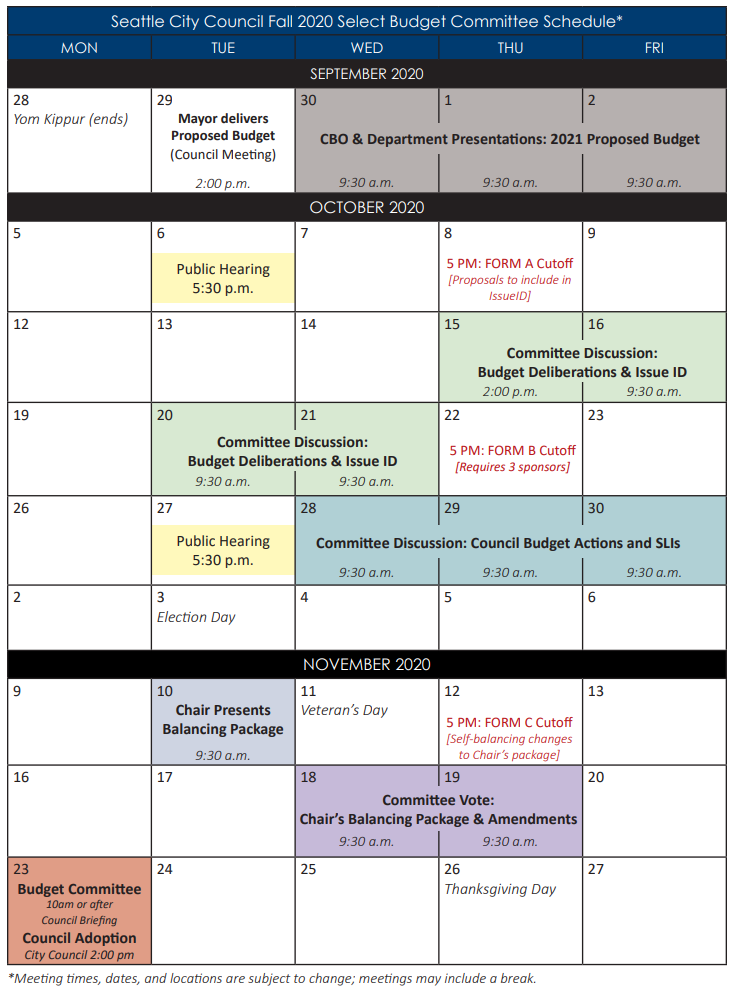Annual Budget Process with City Council: reviewing, amending, and adopting by December 2020 (for 2021)
[NOTE:
- Final Budget: The blog post below discusses the beginning and middle of the Fall 2020 budget process (for 2021). For the separate blog post that details the final results of that process, CLICK HERE.
- Public Safety: While public safety is a key component of our city budget and is discussed below, you can also view my separate posts about reimagining and revamping policing in Seattle by CLICKING HERE.]
Fall 2020: It’s Budget Season (again)! Although “budget season” officially kicked off Tuesday, September 29, 2020 when Mayor Durkan transmitted her budget proposal for 2021, your city government has been working on this budget for months, with each of the mayor’s department heads and her budget office determining how best to invest tax dollars for Seattle next year. City Council then has two months to review, obtain input, amend, and adopt a balanced budget for 2021. Washington State law requires “not later than thirty days prior to the beginning of the ensuing fiscal year the city council shall, by ordinance adopt the budget submitted by the mayor as modified by the city council.” In other words, the Seattle City Council’s deadline is December 2, although the Council has traditionally adopted the amended budget on the Monday before Thanksgiving. As is typical for cities across the nation, our city MUST adopt a budget that is balanced.
The total (all funds) budget is $6.5 billion. Yes, that’s BILLION. That includes the $1.5 billion General Fund, Seattle City Light, Seattle Public Utilities, and transportation and other capital projects. See pie charts and links below. Due to the COVID pandemic, revenues fell by $300 million in 2020 and $200 million for 2021 forcing departments to reduce some programs and projects to balance the budget even as the Mayor’s budget uses the new payroll tax.
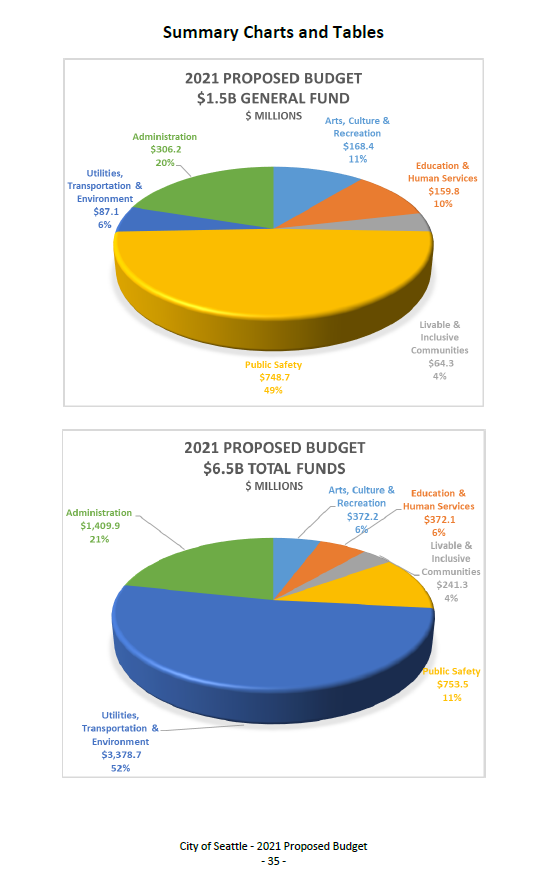
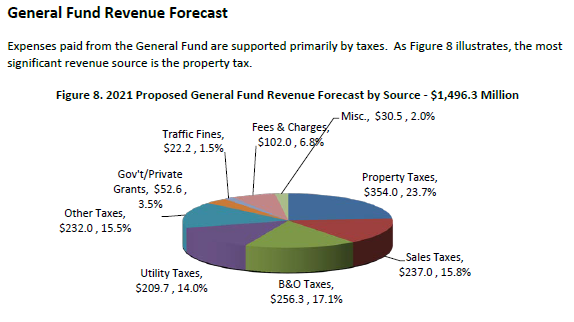
My Initial Thoughts on Chair Mosqueda’s Balancing Package (Nov 9, 2020):
“I appreciate the hard work our Mayor, City departments, City Council staff, and Budget Chair invested into this 2021 budget proposal and the flurry of initial amendments. There are many important choices made when crafting a budget of $6.5 billion covering 40 departments and 12,000 government employees and the final result is never perfect as the law requires a balanced budget under a tight deadline. I remain concerned this amended budget would allow pay increases for city government when we still have so many needs in our communities, such as sheltering more people experiencing homelessness, preventing displacement from Seattle, quickly scaling up BIPOC-informed strategies for public safety, cleaning up litter, and repairing our aging bridge infrastructure for safety, transit, and economic recovery. I look forward to working with my colleagues to make this budget as strong as it can be before final passage.“
Thoughts on Mayor Durkan’s Budget Proposal (Sept 29, 2020):
“Based on my initial review, I believe Mayor Durkan and her team have put forward a thoughtful and responsible balanced budget and I hope my colleagues on the City Council choose to consider it in a collaborative and constructive manner. Nevertheless, instead of spending up to $30 million to increase the salaries of many city government employees, I strongly believe we should invest those dollars to provide housing and case management for people experiencing homelessness and to maintain the safety of our city’s aging bridges. In addition, the City Council and executive branch leaders in charge of labor negotiations should immediately revamp the dysfunctional police union contract that has become a disservice to good police officers and all communities. Rather than distracting everyone by stirring up a budget process high on drama and low on results, those in charge of labor negotiations at City Hall should tackle the real work of redoing that expensive, inflexible, and unjust contract so that we can truly reimagine public safety. I stand ready to support them.“
My Remarks on SDOT’s budget proposal, as Chair of the City Council Committee on Transportation & Utilities (Oct 2, 2020):
“As we see at all levels of government throughout our nation, the budget for our Department of Transportation is facing the reality of back-to-back budget deficits as transportation revenue sources drop dramatically due to the COVID pandemic and the related economic recession. In light of the budget deficits, I know Director Zimbabwe and his executive team of transportation experts at SDOT have been working hard to prioritize our investments to make the hard choices of where to trim expenses and pause projects while giving extra attention to the West Seattle Bridge. Despite temporary reductions elsewhere, I’m glad to see the Mayor and SDOT striving to maintain funding levels for maintenance of our city’s aging bridges, similar to 2020 investment levels. However, it’s important to remind everyone that our City Auditor’s recent report on all bridges throughout our city calls for substantially MORE spending on bridge maintenance to keep them safe and functional. I appreciate SDOT concurring with the auditor’s recommendation on this need.
Therefore, if there are any increases or changes in SDOT’s budget between now and when the Council adopts it (for example, if the revenue forecast improves or we find savings elsewhere in the City budget), I would expect more dollars to go into bridge maintenance, so that we truly acknowledge the alarming “wake up call” from the sudden closure of the West Seattle Bridge and the poor condition of several City bridges. While I’ll have questions about SDOT’s budget throughout our budget process, I believe SDOT is off to a sensible and solid start in dealing with our fiscal constraints. Despite the fiscal constraints, I believe SDOT is overall doing their best to keep people and freight moving, to encourage transit to benefit both our environment and those who rely on transit, and to keep pedestrians safe throughout our city. I look forward to hearing from SDOT today as they summarize their 2021 operating AND capital budget proposal.“
My Remarks at “Issue Identification” Overview (Oct 15, 2020):
Thank you, Budget Chair Mosqueda, and thank you to our City Council Central Staff for analyzing all the ideas and comments that we have on this budget. I appreciate Chair Mosqueda identifying some common ground to expand the Health One program with firefighters and social workers. I also appreciate the forward-thinking approach by considering not just 2021, but also 2022. One of the strong points about the spending plan for 2022 from the Jump Start revenues is the focus on creating permanent affordable housing to address homelessness.
Considering the multiple crises we are facing, including back-to-back deficits for 2020 and 2021, I believe Mayor Durkan and her team have put forward a budget that is thoughtful and reasonable and I hope my colleagues on the City Council choose to consider it in a collaborative and constructive manner. Fortunately, we already have laws on the books that govern how we build up our Rainy Day reserves over time. If now is not the time to deploy our Rainy Day funds with a global pandemic and back-to-back deficits, I cannot imagine when that would be. I would, however, like to strengthen the current savings policy so that we build up future reserves faster.
An important critique that I believe we must put on the table for discussion is whether we really want to increase salaries by $42 million — on top of pay raises received by city government employees this year and last year. When so many people are out of jobs and our city has such deep needs, I don’t think it’s the right time to increase the pay of city government employees again. So if you look at page 28 of tomorrow’s Miscellaneous Issues memo, you’ll see a range of options to save anywhere from $15 million to $42 million simply by forgoing those pay increases next year. Let’s reinvest the millions of dollars of pay raises to provide shelter and mental health support for people experiencing homelessness so they are no longer living in our parks. Let’s reinvest the millions of dollars in pay raises to invest further in BIPOC communities. Let’s reinvest the millions of dollars of pay raises to increase the safety of our city’s aging bridges. City government can and should invest more in our most vulnerable populations and our aging infrastructure, instead of putting more money in our own pockets. In addition to helping the homeless and our bridges, forgoing pay raises now could also help to save city jobs and prevent layoffs in the future.
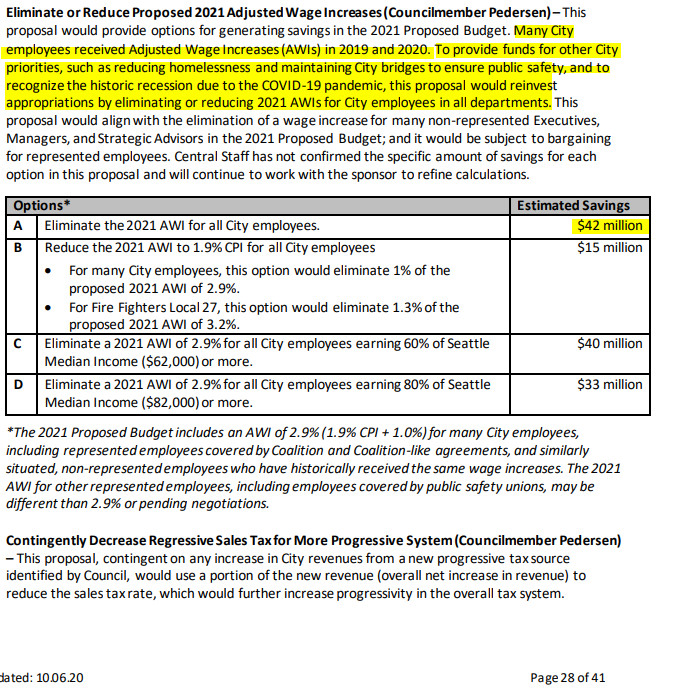
Your Input — Budget Town Hall for D-4, Public Hearings, and More: There are many opportunities to provide input on the city budget throughout the year and especially during this fall budget season when it’s squarely in the court of the City Council:
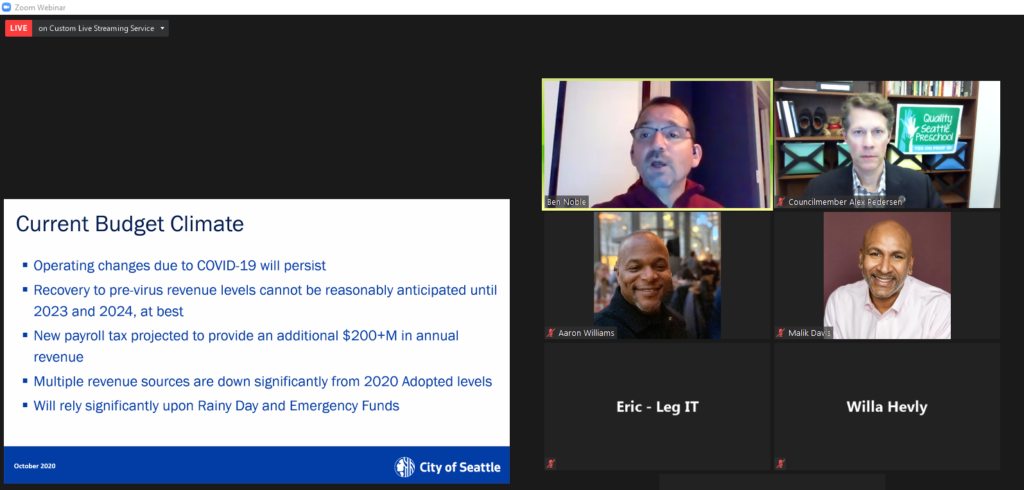
- Budget Town Hall for District 4: Thursday, October 8, 2020 at 6:00 p.m. via Zoom hosted by me. The City Budget Director Ben Noble will join us to provide an overview of the proposed budget along with Community Police Commission co-chair Reverend Aaron Williams. We’ll strive to answer as many budget questions as we can. To sign up, CLICK HERE. [Update: Thanks to those who joined us for our Budget Town Hall! For the presentation from the City Budget Office, CLICK HERE.
- Public Hearings: The entire City Council is also holding two special public hearings on the budget:
- Tuesday, October 6 at 5:30 p.m. (for the Seattle Times article and video/audio on the first public hearing, CLICK HERE).
- Tuesday, October 27 at 5:30 p.m.
- Budget Meetings: You can call into the public comment periods during the budget meetings (for the calendar, CLICK HERE).
- Contact Us: If you are not able to attend my town hall or a public hearing, you can also e-mail my office Alex.Pedersen@seattle.gov and/or e-mail the entire City Council at council@seattle.gov.
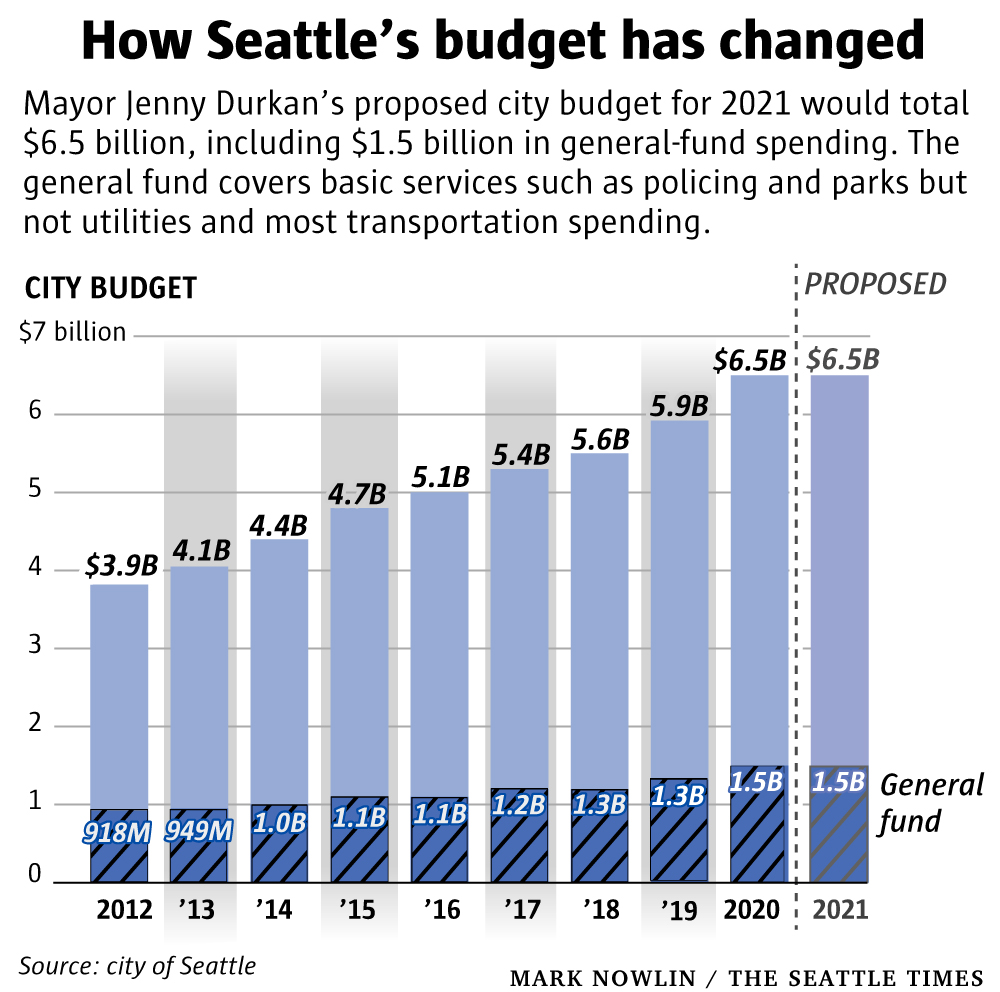
Media Reports:
- Seattle Times
- Sept 29, 2020 article, “Durkan’s 2021 budget would use cuts, reserves and big-business tax to close revenue hole and invest in communities of color”: CLICK HERE.
- Sept 30, 2020 article, “Seattle council members raise questions, concerns about Mayor Jenny Durkan’s 2021 budget plan” CLICK HERE.
- Crosscut
- Sept 29, 2020 article, “COVID-19, unrest shape Durkan’s ‘difficult’ 2021 budget for Seattle”: CLICK HERE.
- Oct 1, 2020 article, “Union negotiations loom over the future of policing in Seattle”: CLICK HERE.
Resources:
- City Budget Office website, CLICK HERE.
- Operating Budget as proposed by Mayor Durkan on September 29, 2020 for the calendar year 2021, CLICK HERE.
- Capital Improvement Program (budget) proposed by Mayor Durkan for 2021-2026, CLICK HERE.
- Mayor’s press release and speech when transmitting her budget proposal, CLICK HERE.
- For this fall’s budget calendar, CLICK HERE.
- City Council Budget Committee website, CLICK HERE.
- penultimate Budget Committee on Thursday, November 17, 2020, CLICK HERE.
- final Budget Committee on Monday, November 23, 2020, CLICK HERE.
- full City Council meeting Monday, November 23, 2020 that adopted the final budget for 2021, CLICK HERE.
- For Council Bill 119811 (original “JumpStart” spending plan) adopted by City Council on July 6, 2020, CLICK HERE.
- For the 2020 audit of Seattle bridges that reinforces the need to invest more dollars in bridge maintenance/safety, CLICK HERE.
- For my brief Op Ed on this budget process published by the Seattle Times, November 23, 2020, CLICK HERE.
- Powerpoint Presentations:
- Overview from City Budget Office, CLICK HERE.
- Seattle Police Department Budget (as proposed), CLICK HERE.
- Reimagining Public Safety (from Mayor’s Office), CLICK HERE.
- Seattle Department of Transportation (SDOT), CLICK HERE.
- Homelessness Response, CLICK HERE.
Related Issues:
- Summer 2020 Budget “Re-Balancing”: If you’ve been following City Hall activities over the past few months, you’ll recall that we recently finalized some budget actions this year, but those comprised a unique summer effort to re-balance this year’s 2020 budget that fell out of balance from the sudden mid-year drop in revenues due to the COVID pandemic. To learn more about my votes on the previous 2020 re-balancing, CLICK HERE for my blog (and then type the word “budget” in the Search box on the top right corner of that website).
- Reimagining Public Safety: If you’re seeking more details on efforts to revamp the police department (including the police union contract), address institutional racism, and expand community-led crime prevention and harm reduction solutions in the wake of the unjust killings of George Floyd, Breonna Taylor, Charleena Lyles, John T. Williams, and countless other Black, Indigenous, and people of color, please also see my other blog post: https://pedersen.seattle.gov/injustice-anywhere-is-a-threat-to-justice-everywhere/ For a Crosscut news article highlighting the importance of revamping the police union contract — which is needed to make the most meaningful changes to the SPD budget — CLICK HERE.
# # #
Posted: October 8th, 2020 under Councilmember Pedersen

